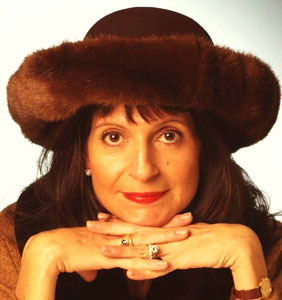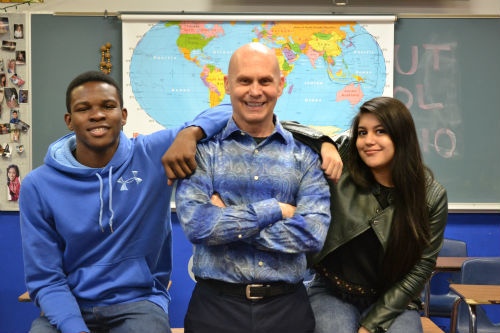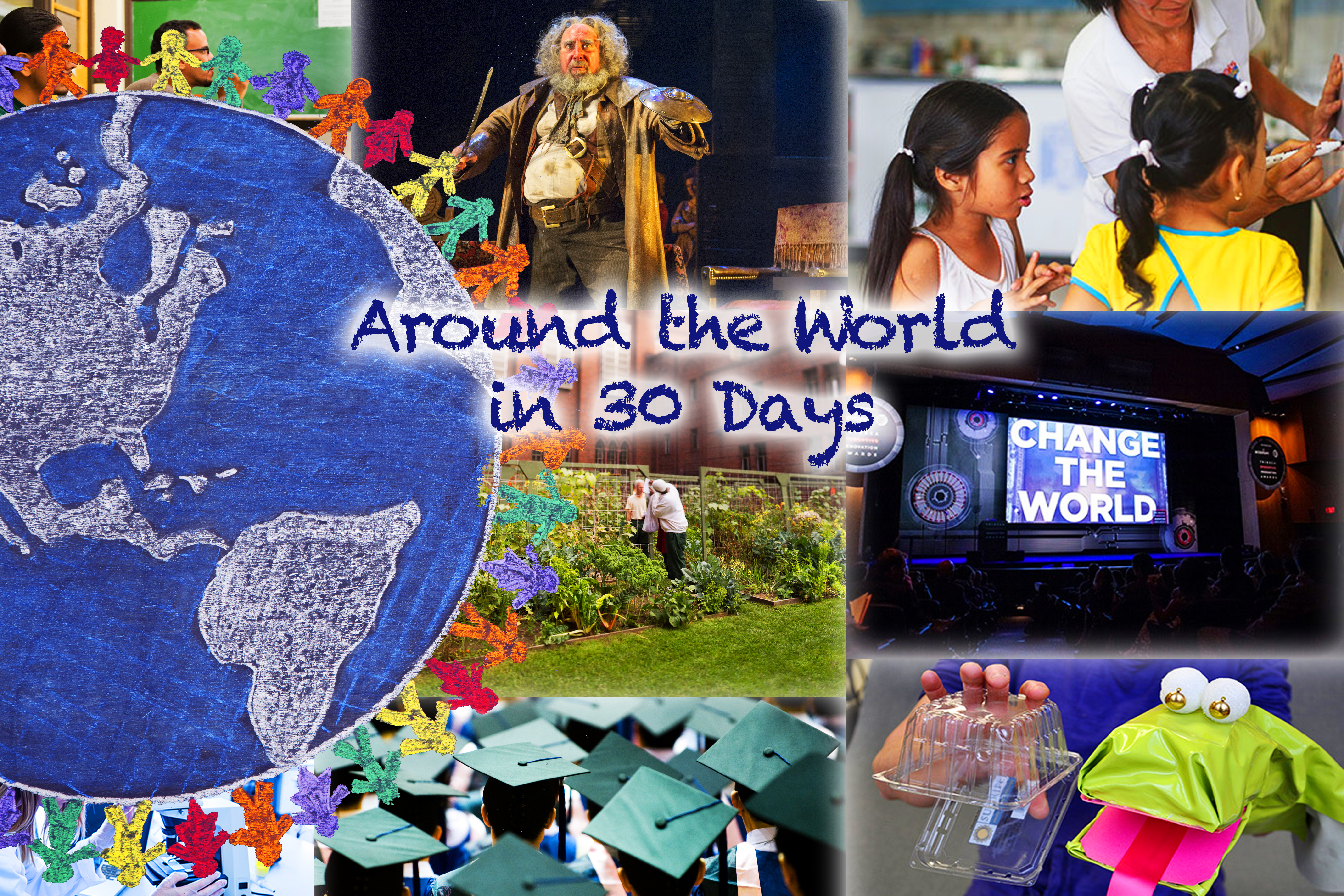
Questo mese, I continued my conversations with leaders from around the world on today’s pressing issues in education – from the challenges of graduates seeking jobs to the psychological burden of bullying, from the Japanese academic community’s protests for peace to the International Baccalaureate’s commitment to multiculturalism. Nel frattempo, locally in New York, I learned how BAM (Brooklyn Academy of Music) and other Arts organizations are helping to complete the comprehensive Cultural Plan for New York City, which aspires to bring arts education to every school in the city. BAM is using new technology to bring their work into classrooms worldwide, making their platform accessible to young audiences and students anywhere at any time.
La ricerca globale per l'istruzione di core mission is to promote sustainable change through global discourse, and so I couldn’t be happier than to talk with George Rupp (former President of Rice University, Columbia University, e l'International Rescue Committee) about his new endeavor as Chair of the International Baccalaureate’s Board of Governors. This program, offered in 146 paesi, is among our favorites as it gives students the perspectives of other cultures, societies and countries through its rigorous criteria for graduation: gli studenti devono prendere sei corsi interdisciplinari, scrivere un documento di ricerca, e servizio alla comunità completo.
In Rupp’s new position, I learned that he’s working towards fostering multicultural competence and building more relations with underrepresented regions of the world. His goals are ones that all institutions should aim for. As he says, “Formazione che è accademicamente rigoroso, deliberatamente multiculturale, and concerned with developing personal values that include a commitment to community service, is an invaluable resource for any and all of us.”
I received many emails in the past few months from scholars appealing Japan’s attempt to lift the constitutional ban on collective self-defense (CSD). If CSD is lifted, this could reignite participation in war for a country that has had its fill of battle. As I looked more into it, I was happy to support this cause, which grew to include over 9000 studiosi. I talked to Dr. Manabu Sato (Professor Emeritus, Università di Tokyo), who co-led the initiative called Association of Scholars Opposed to the Security Related Bills. Sato calls the bill “not simply unconstitutional but also an attack on the key principles of constitutionalism and the rule of law,” adding that we also need to “challenge the hypocrisy exhibited by many Western governments, compresi gli Stati Uniti, che generalmente accogliere il tentativo del governo Abe a revocare il divieto di CSD, under the name of ‘pro-active contribution to peace’ through which Japan plays a bigger role in defending the ‘rule of law’ nel contesto di conflitti marittime e territoriali dell'Asia.”
In July, I asked our global teacher bloggers about a pertinent and poignant issue: bullismo. Dr. Tracey C. Burns, a Project Leader at the OECD in Paris and a global expert on bullying, confirms that “a huge amount of political attention is being paid to the issue.” Statistics repeatedly show the prevalence of bullying in American schools, and new research suggests that social media has brought school bullying into the home. Many bold recommendations were offered from teachers, all of whom brought their personal experience to tackling this difficult issue. Guest blogger James Alan Sturtevant recommended reaching out to bullies – noting that “harsh consequences don’t always work, can make bullies worse, and sometimes evoke retribution for unfortunate victims.” And Pauline Hawkins cautioned that anti-bullying programs in schools will have little influence on students if the adults in their lives are not teaching and modeling respect.” We also heard from Australian expert Lisa Currie (Ideatore del progetto Gentilezza Ripple), who recommended the practice of fostering kindness in schools and offered many real world examples of how to do this.
While many think of New York and California as the go-to places for post-college jobs, a recent report has shown that actually Massachusetts, Delaware, e Washington hanno il maggior numero di aperture di lavoro per laureato. Io got to talk this month with Anthony P. Carnevale, the report’s lead author and the director of Georgetown University’s Center on Education and the Workforce. For parents and students anxious about the meagerness of today’s job market, Carnevale has given a report, which as he says, ha “the ability to connect real people with real jobs in real time.” His report has remarkable findings that will be a boon to anyone who wants to know about the reality of post-college life. One of many insights this report provides is that “gli sviluppatori di software, infermieri, and managers are among the most in-demand professionals in every state.”


Unitevi a me e leader di pensiero di fama mondiale tra cui Sir Michael Barber (Regno Unito), Dr. Michael Block (Stati Uniti), Dr. Leon Botstein (Stati Uniti), Il professor Argilla Christensen (Stati Uniti), Dr. Linda di Darling-Hammond (Stati Uniti), Dr. MadhavChavan (India), Il professor Michael Fullan (Canada), Il professor Howard Gardner (Stati Uniti), Il professor Andy Hargreaves (Stati Uniti), Il professor Yvonne Hellman (Paesi Bassi), Il professor Kristin Helstad (Norvegia), Jean Hendrickson (Stati Uniti), Il professor Rose Hipkins (Nuova Zelanda), Il professor Cornelia Hoogland (Canada), Onorevole Jeff Johnson (Canada), Sig.ra. Chantal Kaufmann (Belgio), Dr. EijaKauppinen (Finlandia), Sottosegretario di Stato TapioKosunen (Finlandia), Il professor Dominique Lafontaine (Belgio), Il professor Hugh Lauder (Regno Unito), Signore Ken Macdonald (Regno Unito), Il professor Geoff Masters (Australia), Il professor Barry McGaw (Australia), Shiv Nadar (India), Il professor R. Natarajan (India), Dr. PAK NG (Singapore), Dr. Denise Papa (Stati Uniti), Sridhar Rajagopalan (India), Dr. Diane Ravitch (Stati Uniti), Richard Wilson Riley (Stati Uniti), Sir Ken Robinson (Regno Unito), Professor Pasi Sahlberg (Finlandia), Il professor Manabu Sato (Giappone), Andreas Schleicher (PISA, OCSE), Dr. Anthony Seldon (Regno Unito), Dr. David Shaffer (Stati Uniti), Dr. Kirsten Immersive Are (Norvegia), Cancelliere Stephen Spahn (Stati Uniti), Yves Theze (LyceeFrancais Stati Uniti), Il professor Charles Ungerleider (Canada), Il professor Tony Wagner (Stati Uniti), Sir David Watson (Regno Unito), Professor Dylan Wiliam (Regno Unito), Dr. Mark Wormald (Regno Unito), Il professor Theo Wubbels (Paesi Bassi), Il professor Michael Young (Regno Unito), e il professor Zhang Minxuan (Porcellana) mentre esplorano le grandi questioni educative immagine che tutte le nazioni devono affrontare oggi.
Il Global Ricerca per l'Educazione della Comunità Pagina
C. M. Rubin è l'autore di due ampiamente lettura serie on-line per il quale ha ricevuto una 2011 Premio Upton Sinclair, “Il Global Ricerca per l'Educazione” e “Come faremo a Leggere?” Lei è anche l'autore di tre libri bestseller, Compreso The Real Alice in Wonderland, è l'editore di CMRubinWorld, ed è un disgregatore Foundation Fellow.
Segui C. M. Rubin su Twitter: www.twitter.com/@cmrubinworld





Commenti recenti